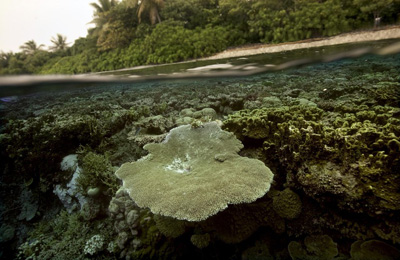Growing natural hazards from coastal storms, flooding, and rising sea levels are leading to major investments worldwide in coastal defense structures such as seawalls and breakwaters. A new study shows that coral reefs can provide risk reduction benefits comparable to artificial defenses, and reef restoration and enhancement is a cost-effective alternative to manmade structures.
The study, published May 13 in Nature Communications, was co-led by Michael Beck, lead marine scientist for the Nature Conservancy and a research associate at the Institute of Marine Sciences (IMS) at UC Santa Cruz.
"We show that reefs can be particularly cost-effective as a first line of defense in comparison to artificial structures," Beck said. "We now have solid numbers to show just how important reefs are in reduction of wave energy. This is an issue that matters to hundreds of millions of people."
The researchers performed a systematic search of the scientific literature and analyzed published data on the contributions of coral reefs to risk reduction. The combined results showed that coral reefs dissipate 97 percent of the wave energy that would otherwise impact shorelines. Wave energy is a key factor in storm damage and coastal erosion. The researchers also found that most of the wave energy (86 percent) is attenuated by the reef crest, an important finding for guiding reef restoration efforts, Beck said.
Coral reefs face many threats--such as climate change, ocean acidification, coastal development, and destructive fishing practices--but Beck said there is still cause for optimism.
"People forget that coral reefs currently are in better shape than any other coastal habitat. We've lost more of our oyster reefs, marshes, and mangroves, so there's still a lot of coral reef habitat to work with," he said. "It's time to start taking action to preserve and restore this first line of defense for coastal hazard reduction."
The researchers estimated that there are nearly 200 million people living in coastal areas where they may benefit from the protection afforded by coral reefs, or bear the cost if reefs are lost or degraded.
Beck is currently working with a UCSC postdoctoral researcher, coastal engineer Borja Reguero, on a joint TNC-UCSC effort to design a coral reef restoration project for coastal defense in Grenada.
"We can do things to rebuild the structure of a reef and help kick-start the growing of living corals on top. We think that can be a particularly cost-effective approach for rebuilding this first line of defense," he said.
In addition to Beck, the coauthors of the paper include Filippo Ferrario and Laura Airoldi from the University of Bologna; Curt Storlazzi at the USGS Pacific Coastal and Marine Science Center (also a research associate at UCSC's Institute of Marine Sciences); Fiorenza Micheli at Hopkins Marine Station; and Christine Shepard from UCSC.




